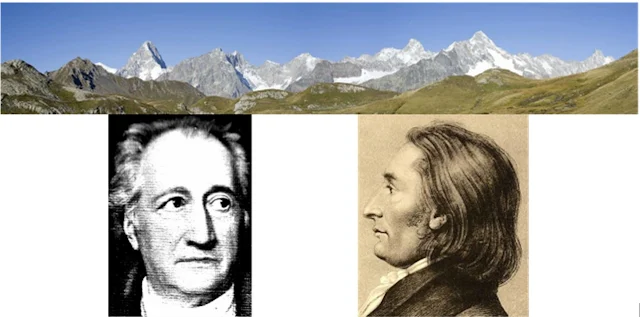G O E T H E (2)
& the Shakespeare Authorship (part 2) ,
Goethe's understanding of Shakespeare
______________
Shakespeare greatness and his gigantic neighbours
→Translated by John Oxenford
I [Eckermann turned the conversation back to Shakspeare. ]" When one, to some degree, disengages him from English literature," said I, " and considers him transformed into a German, one cannot fail to look upon his gigantic greatness as a miracle. But if one seeks him in his home, transplants oneself to the soil of his country, and to the atmosphere of the century in which he lived; further, if one studies his contemporaries, and his immediate successors, and inhales the force wafted to us from Ben Jonson, Massinger, Marlow, and Beaumont and Fletcher, Shakspeare still, indeed, appears a being of the most exalted magnitude; but still, one arrives at the conviction, that many of the wonders of his genius are, in some measure, accessible, and that much is due to the powerfully productive atmosphere of his age and time."
"You are perfectly right," [returned Goethe]." It is with Shakspeare as with the mountains of Switzerland. Transplant Mont Blanc at once into the large plain of Luneburg Heath, and we should find no words to express our wonder at its magnitude. Seek it, however, in its gigantic home, go to it over its immense neighbours, the Jungfrau, the Finsteraarhorn, the Eiger, the Wetterhorn, St. Gothard, and Monte Rosa, Mont Blanc will, indeed, still remain a giant, but it will no longer produce in us such amazement." " Besides, let him who will not believe," continued Goethe, " that much of Shakspeare's greatness appertains to his great vigorous time, only ask himself the question, whether a phenomenon so astounding would be possible in the present England of 1824, in these evil days of criticising and hair-splitting journals?
Goethe's view on Shakespeare
→Translated by John Oxenford
I [Eckermann turned the conversation back to Shakspeare. ]" When one, to some degree, disengages him from English literature," said I, " and considers him transformed into a German, one cannot fail to look upon his gigantic greatness as a miracle. But if one seeks him in his home, transplants oneself to the soil of his country, and to the atmosphere of the century in which he lived; further, if one studies his contemporaries, and his immediate successors, and inhales the force wafted to us from Ben Jonson, Massinger, Marlow, and Beaumont and Fletcher, Shakspeare still, indeed, appears a being of the most exalted magnitude; but still, one arrives at the conviction, that many of the wonders of his genius are, in some measure, accessible, and that much is due to the powerfully productive atmosphere of his age and time."
"You are perfectly right," [returned Goethe]." It is with Shakspeare as with the mountains of Switzerland. Transplant Mont Blanc at once into the large plain of Luneburg Heath, and we should find no words to express our wonder at its magnitude. Seek it, however, in its gigantic home, go to it over its immense neighbours, the Jungfrau, the Finsteraarhorn, the Eiger, the Wetterhorn, St. Gothard, and Monte Rosa, Mont Blanc will, indeed, still remain a giant, but it will no longer produce in us such amazement." " Besides, let him who will not believe," continued Goethe, " that much of Shakspeare's greatness appertains to his great vigorous time, only ask himself the question, whether a phenomenon so astounding would be possible in the present England of 1824, in these evil days of criticising and hair-splitting journals?
Goethe must have intuitively felt and recognized that the strength of contemporary literary authors (such as Marlowe, Beaumont, Fletcher, Massinger and others) was an integral part of Shakespeare without understanding that the true poet-genius represented almost the total Group of "mountains" himself, the total mountains of "names", "initials" and "pseudonyms" (incl Shakespeare)
----------------
Shakespeare als Dichter
Johann Wolfgang von Goethe
( Hörbuch German )
—————VIDEOS – Complete Video Archive:OPEN —> Heading--> Home -->Videos -- Shorts -- Posts ->Popular
—————
VIDEOS – Complete Video Archive:
OPEN —> Heading--> Home -->Videos -- Shorts -- Posts
->Popular

